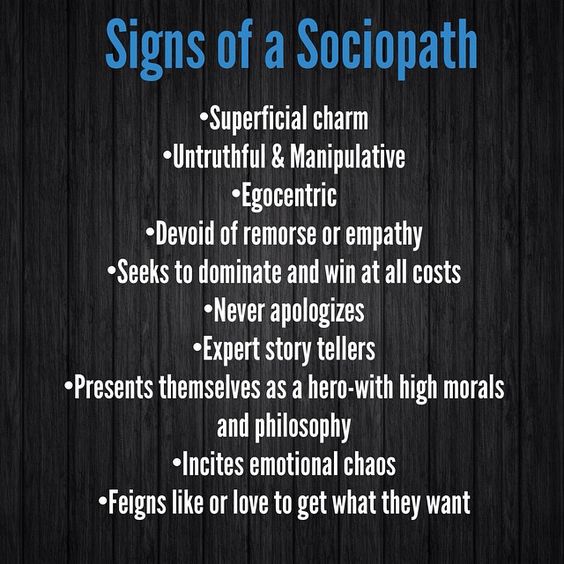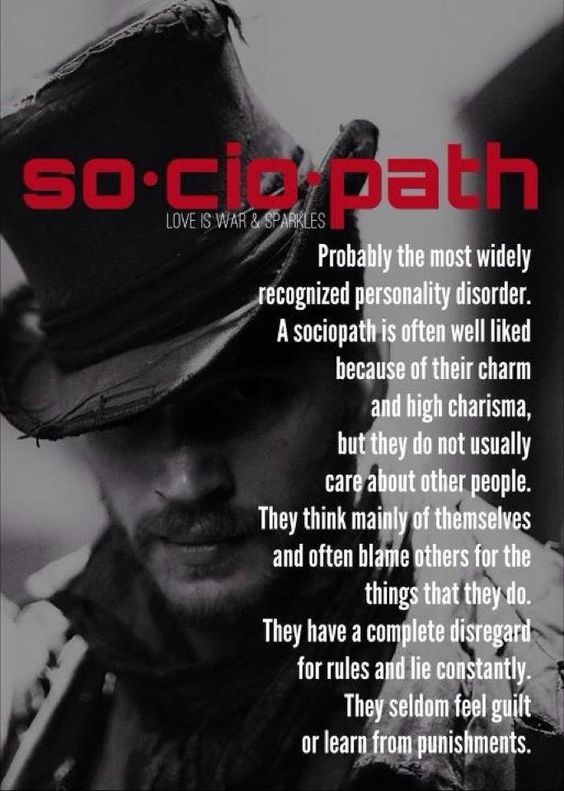
Sociopaths are known to be inhuman, masters of manipulation and deceit, violent people who do nothing good but just harm every person around them. This is made true with the statement “Sociopaths are manipulative because they are trying to achieve what they want for themselves in the world,” says Joshua Klapow, PhD. Isn’t the society being too judging of these people we have labeled as sociopaths? As what Paul Chernyak, LPC said, sociopaths “..will often overreact strongly to minor or perceived offenses. If they are challenged or confronted about it, they will attempt to divert attention away from themselves…” Are they really that bad?
The Successful Sociopaths
It’s hard to believe that sociopaths have no conscience. Maybe not as in zero at all, but they do have a weak conscience. And their weak conscience, influenced by neglect and feeling unloved, have led them to harden their hearts. However, not all sociopaths were neglected growing up.
Some sociopaths were raised in an environment that is nurturing, loving, and caring.
Some successful people in their chosen careers are later diagnosed to be sociopaths. Experts in the field articulated that growing up with guidance, nurturing, and proper education is what makes the difference. They learn how to focus being self-serving and the self-centeredness to something positive – something they will benefit from living a more comfortable life, where they can have the fame, the thrill, and the control that makes them feel alive. According to Darrel Turner, PhD “This is someone who has a high level of confidence and belief in themselves, but to a very unhealthy and harmful extent—to the point at which it actually distorts their sense of reality about themselves, other people, and the world around them. It can also lead them into manipulative and exploitative behavior, because they will prioritize their own needs above anyone else’s.”
The charismatic, controlling CEOs find the game in business thrilling and satisfying. Stock markets give them delight. Success is their way to fame, with no cares if they have to break some morals.
Sociopaths Are Just Thrill Seekers; They Never Mean To Hurt
In one interview with a psychopath, he said that hurting was never his motive. He’s just seeking self-enjoyment and self-satisfaction. That is why he doesn’t feel remorseful for the wrong things he had done because he sees nothing wrong in satisfying his desires. Being said that they don’t have the capacity to love, they also can’t do the opposite.
Normal people (as we consider ourselves) have the capacity to love, but when we get hurt, we also intentionally tend to hurt other people. We feel the guilt after because, in our mind, we did something terrible consciously, and we did such out of anger.
No One Is Born Evil
Studies done at The Baby Lab show that babies already have an idea of what is right and wrong. So, babies are born not just of evil, but the knowledge of what is good is also imprinted in their memory. This knowledge is further developed as we are growing up, influenced by people around us; they can be our parents, siblings and other relatives, friends, and now the media.

Innate in us is good and evil. How we control and our perception of those ideas vary and depend on how we are raised. There are times when people are forced to do bad things when pushed to the edge. Circumstances make us do things, which we may regret later on. This regret makes us change. But sociopaths never feel remorse, they rationalize their actions, and rationalization can somehow make them think of changing their behavior, too. As Noah Rubinstein, LMFT, LMHC, said “it’s clear that sociopaths are quite capable of evil.”
Self-Awareness, One’s Urge To Change
Self-awareness makes a sociopath accept he is a sociopath; it is one of his best assets. And when someone points out to him that what he has done is wrong, he will give it a deep thought and analyze what is wrong with his action. However, there is no feeling of remorse as he rationalizes his deeds. He has that thinking that maybe next time, he can change or refrain from doing some of his actions because he doesn’t want to harm anyone. That is according to one sociopath, who brought his children once to some thrill-seeking adventure. All he wanted was to have fun and never intended to put his children at risk. But when his wife pointed out these things to him, he gave it a thought. He doesn’t feel sorry for what he has done and even rationalized that he didn’t think it is wrong as he saw his kids enjoying the moment.
Most of us do things to our self and others without thinking of the consequences. All we think of is the thrill and excitement we’re getting from it at the moment.
The difference is always that there’s a guilt feeling after when we are normal, and there’s none when you’re a sociopath. “Lacking empathy, they don’t feel badly for those they hurt but think of them as easy prey,” says psychotherapist Karen R. Koenig, M.Ed., LCSW. But still, the same, sociopaths have the choice of whether or not they are going to do it again, or be more cautious in the future. They, too, question and analyze their actions when their actions are brought to their attention. We just have different ways of rationalizing every situation.

A Sociopath Is A Sociopath
Sociopaths can change or may have the urge to, but they can never really remove the internal aspects that define them as sociopaths.
We just have to stop saying that they have no conscience, but instead believe that they, too, may have one. No matter how weak conscience is, it is the same conscience. Anything that is weak can be strengthened in some ways. A weak conscience can be fixed with acceptance, followed by love and care. No one wants to be looked at by a judging eye; no one wants to be looked at as if he is a criminal – not a sociopath, not a normal person.
Sociopaths, too, have the right to be part of this society. In fact, in the 1% of the population who are considered sociopaths, some of them have contributed to the wellness of their community or nation. Some of them have declared their advocacy for the welfare of humankind. It may be just to challenge themselves, a sort of way to tickle their mind a little, but never to harm anyone.
Having the urge to change is often brought by the love we receive. All of us are longing for that thing. Even those who don’t have the capacity to give love are waiting to receive it. Love is always the trigger for change.
A sociopath’s capacity for empathy may be weak, but he, too, can engage in it. A sociopath’s urge to change may depend on the value inculcated in him and the amount of love, patience, and care he is receiving, considering the benefits that he can get when he tries to make a 180-turn around for what seems to be better. It is doubtful to change their thought processes but what they can definitely change is how they can respond to them.